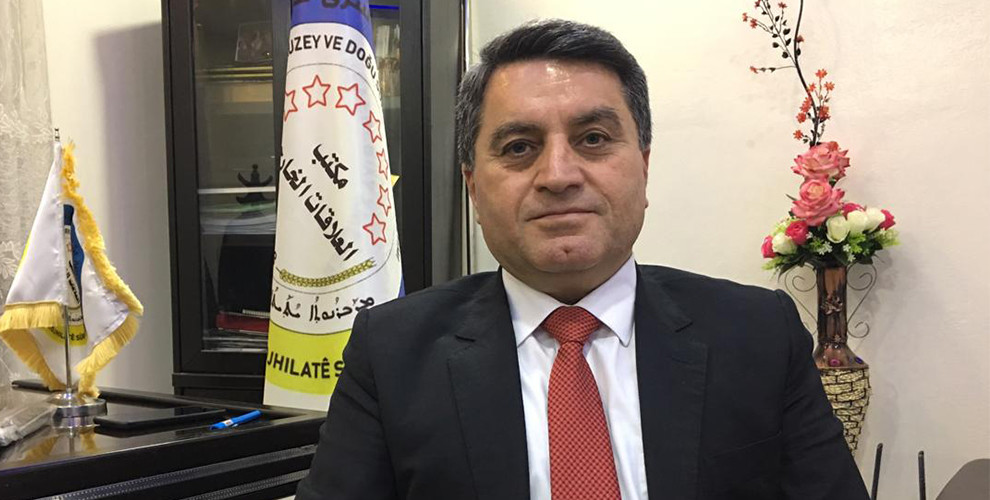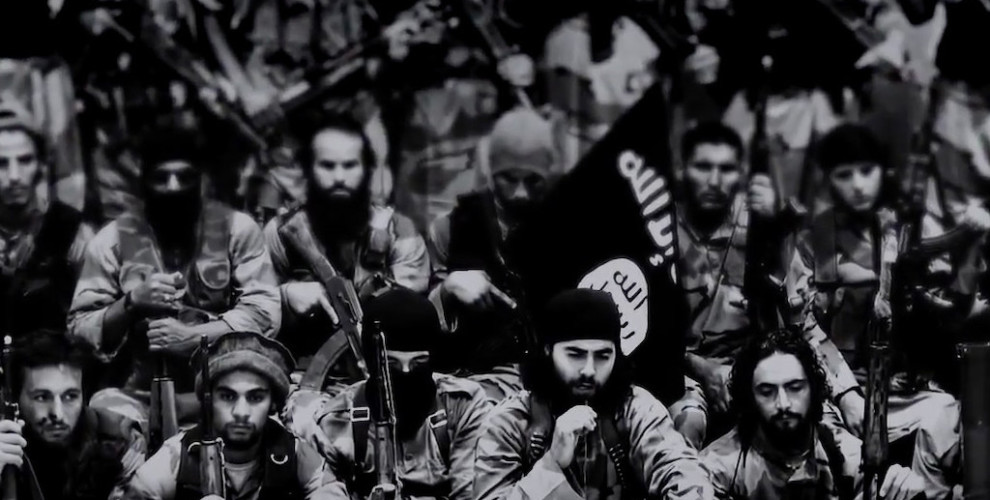Northern and Eastern Syrian Democratic Autonomous Administration Foreign Relations Council Co-chair Dr. Abdulkerim Omer spoke to the ANF about the situation of ISIS members in custody and an international solution.

Abdulkerim Omer pointed out that the ISIS members and their families in custody in their territory pose a great international threat: “If international powers want to prevent this threat, each country should take back the ISIS members who are their citizens. They should put the ISIS members on trial, they should rehabilitate women and children and return them to society. This would prevent the great threat from developing. If they don’t do that, this matter will continue to pose a great potential threat against us, and them.”
How long have the ISIS members and their wives been surrendering to the Syrian Democratic Forces?
Since the liberation of Kobane, many ISIS members were captured by the SDF. During the Manbij, Tabqa, Raqqa and Deir ez-Zor operations many ISIS members surrendered to the SDF along with their families and many more were captured by the SDF.
How many ISIS members are there currently in custody?
The number of ISIS members in our custody who aren’t Syrian citizens was around 800 a few weeks ago. But, with the liberation of the Baghouz village, the number rises daily. Of course the number of Syrian ISIS members is much higher than that, but currently there are ISIS members, their wives and children from 49 countries in our custody.
The ISIS members have families. Both Syrians and foreigners have wives and families. The biggest part in this is the wives and children of ISIS members, who have been placed in migrant camps. We treat these people as we treat any other migrant, and we fulfill our responsibility as best we can. We also see to the needs of ISIS members in our prisons, for that matter.
What is your approach for a solution to the issue of Syrian ISIS members and their families?
Syrian members, their wives and children are our responsibility as the Northern and Eastern Syrian Democratic Autonomous Administration. We send ISIS members to people’s courts. We hand over women who don’t have blood on their hands to their own communities through opinion leaders and their clans.
One other thing is that we have set up an education center in Hawl for the rehabilitation of such Syrian children. We are working on this. We can fulfill our responsibility to the Syrian people.
Do the states whose citizens you have in custody fulfill these responsibilities?
Unfortunately, the international community, even our partners in the fight against ISIS, don’t. They fail in both repatriating their citizens, and in seeing to their needs. There is a large number of ISIS families in the refugee camps right now. We treat them as we treat any other refugee. We try to see to their needs as much as our resources allow. We see to the vital needs of the imprisoned gang members. But, unfortunately, the international community, the states, the international aid organizations and the Red Cross for instance have all failed to fulfill their duties on this matter.
The aid they have provided to date isn’t even 5% of what is needed for the arrested ISIS members and their families. We carry this load alone. This is a truly great amount. It is impossible for us to actually manage it alone.
The ISIS issue has been an international threat and problem. Isn’t it an international issue that the ISIS members and their families in great numbers all together in Northern and Eastern Syria, which still doesn’t have its status recognized internationally and is facing threats of invasion as of now?
This is a great burden and the definition of a great threat. Like ISIS posed a threat against all peoples in the region as long as they were present in our territory, the presence of these foreign ISIS members contains a threat in itself. There was a coordination effort between us and the international coalition forces over these. ISIS as a state is disappearing. One of the biggest issues at hand for us now is the ISIS members and their wives and families in our custody. This is an international issue. These women and children are in our territory, but this is not just a threat against our country, it is a threat at the international level.
The issue regarding our land and the Syrian problem is not yet resolved. Political stability is not that clear. Our territory is under threat of attack from the Turkish state and its allies. If the Turks attack here, or another conflict breaks out, it would be an opportunity for these ISIS members to escape from prison. Then these escaping ISIS members would pose a great threat to us, and in the international arena. This is also dangerous for the countries they come from, because these people have many children. I estimate that with the liberation of Baxoz, the number of these ISIS members will increase to thousands. Most of these children have been trained with the ISIS mindset. If these children educated in the terrorist mindset are not reeducated, if they don’t return to their own communities, they will all come back as implemented practices of terrorist projects in the future. This is also true for the women.
How could this threat be neutralized?
We as the peoples of Rojava and Northern Syria have paid a great price in the fight against ISIS. The ISIS members we have detained were captured in this fight that cost us greatly. During questionings and interviews with these captured and arrested ISIS members, it has come to light that they were planning attacks throughout Europe, which we prevented. We have fulfilled our duties and captured these ISIS members.
If international powers want to prevent this threat, each country should take back the ISIS members who are their citizens. They should put the ISIS members on trial, they should rehabilitate women and children and return them to society. This would prevent the great threat from developing. If they don’t do that, this matter will continue to pose a great potential threat against us, and them.
What diplomatic efforts are you engaged in for these 49 states to repatriate their ISIS member citizens as the Northern and Eastern Syria Foreign Relations Council?
We have ISIS members who are citizens of 49 countries and their official documentation. We have files on the ISIS members and their wives and children.
Internationally, we hold meetings with the countries ISIS members are from for their repatriation. These countries unfortunately don’t fulfill their responsibilities or take back their own citizens.
What explanation have they given for not taking their citizens back?
Unfortunately, international powers and countries we have relationships with -including Europe- refuse to repatriate their ISIS member citizens because they pose a threat to their countries. They say, “These are dangerous people, they shouldn’t return to our lands but stay there.” This is a grave wrong in itself.
I repeat, it is a boon for these countries that the ISIS members are under arrest, but them being kept en masse in a country, much less one like ours which lacks an official status and is still under risk, is a great threat.
Some states have taken their ISIS member citizens back to their countries. What can you say about them?
Some, very few states, have taken their ISIS member citizens back, which does amount to very few ISIS members in total in fact.
Russia took back very few women and children from Shishan.
Indonesia took back a large family of 27 persons. This was a family of a mother, father and their children. They were educated and financially well off. They just came to Syria to live in ISIS territory, because they thought they would be going to live in an Islamic state. The men were later imprisoned for refusing to fight for this so called “Islamic State”. They fled the prison at the first chance they got and sought refuge with SDF forces. We then contacted their country and handed them over.
The Sudan took back two women and some of their children.
The US took back one American woman and her 4 children.
Kazakhstan took back 5 gang members, 11 women and 3 children.
This of course is but a fraction of the arrestees in our custody. To date, countries have failed to fulfill their responsibility and take care of these persons who are their citizens.
There is an alternative suggestion in development recently that because these states are not taking their citizens back, an international court could be set up in your territory and ISIS members could face trial there. What do you as the Democratic Autonomous Administration think about that?
If the Coalition and the European Union member states won’t handle this issue, then alternatives must be sought. There could be an interstate conference or congress. We must be able to discuss how we will resolve this issue, and find a solution. A dialogue could develop and many alternatives could be conjured up including a joint interstate court. Any and all discussion could occur at that point. A joint method could be developed to resolve this issue.
We have issued calls before for them to take back their citizens. Trump issued a call over social media too, for European states to repatriate their citizens. All European states had a negative reaction to that and they all said they will not repatriate. If they refuse to repatriate their citizens, at least an alternative way must be devised and discussed, and we must be able to create a common intelligence regarding the solution of this issue.
Do you have an official resolution regarding this matter?
We are discussing how to create alternatives, but we haven’t issued an official resolution for such a proposal yet. Our meetings and dialogues continue. What we know is this: This issue is connected with how ISIS was handled as a common problem and acted against together, which is showing results now. Through dialogue and through giving everyone an opinion, another common solution needs to be produced.
We haven’t issued an official decision to propose an international court as an alternative. Our internal discussions on that matter continue.
What would the criteria be for such an international court, should you officially propose one?
If there will be an international court, it must be recognized internationally. The international community must build the prisons. The states involved must take it upon themselves to provide for the daily needs of these prisoners. They should be able to take on the defense of these courts as well. Camps should be set up for the wives and children of ISIS members, and their needs need to be seen to as well, including reeducation. All these things I list are the duties that should be taken on by the international community.
To reiterate, an international congress or conference should be gathered to discuss these issues and to find a solution. We know this is a heavy burden, but we cannot undertake it alone. The presence of these people in the region is a threat for society, the peoples of the region and for other nations. We must create a solution together. But we still believe that the basic solution is for these states to repatriate their citizens and put them on trial in their own countries.














